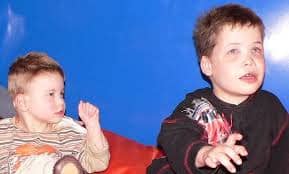In the majority of these (96%) the learning difficulties are classified as severe.
At birth, the children are usually floppy and it is often apparent in the first 6-9 months that the baby’s development is delayed. The “motor milestones”, such as sitting unsupported, are delayed. Some never crawl, and those that do eventually walk may not start till late in childhood. Most remain in nappies, though occasionally, with training, a degree of bowel and bladder control may be achieved. Many children will learn to drink from a cup or beaker and will finger feed or use a spoon.
Speech is usually absent though some learn a few words and a small repertoire of Makaton signs. The childrens’ comprehension is also affected. Some are restricted to recognition of the family and awareness of their surroundings, and may be upset by a change to their daily routine. Others understand more, such as learning where a biscuit tin is kept, learning to turn on the TV and obeying simple commands. The boys may continue to acquire new skills for many years. Although physical illness may set the children back, it is not usual for them to regress developmentally or lose skills.
A number of families with more than one affected child have told us that there is quite a marked difference in the abilities of the boys. The reason for this is unclear. Birth order is not a factor.



